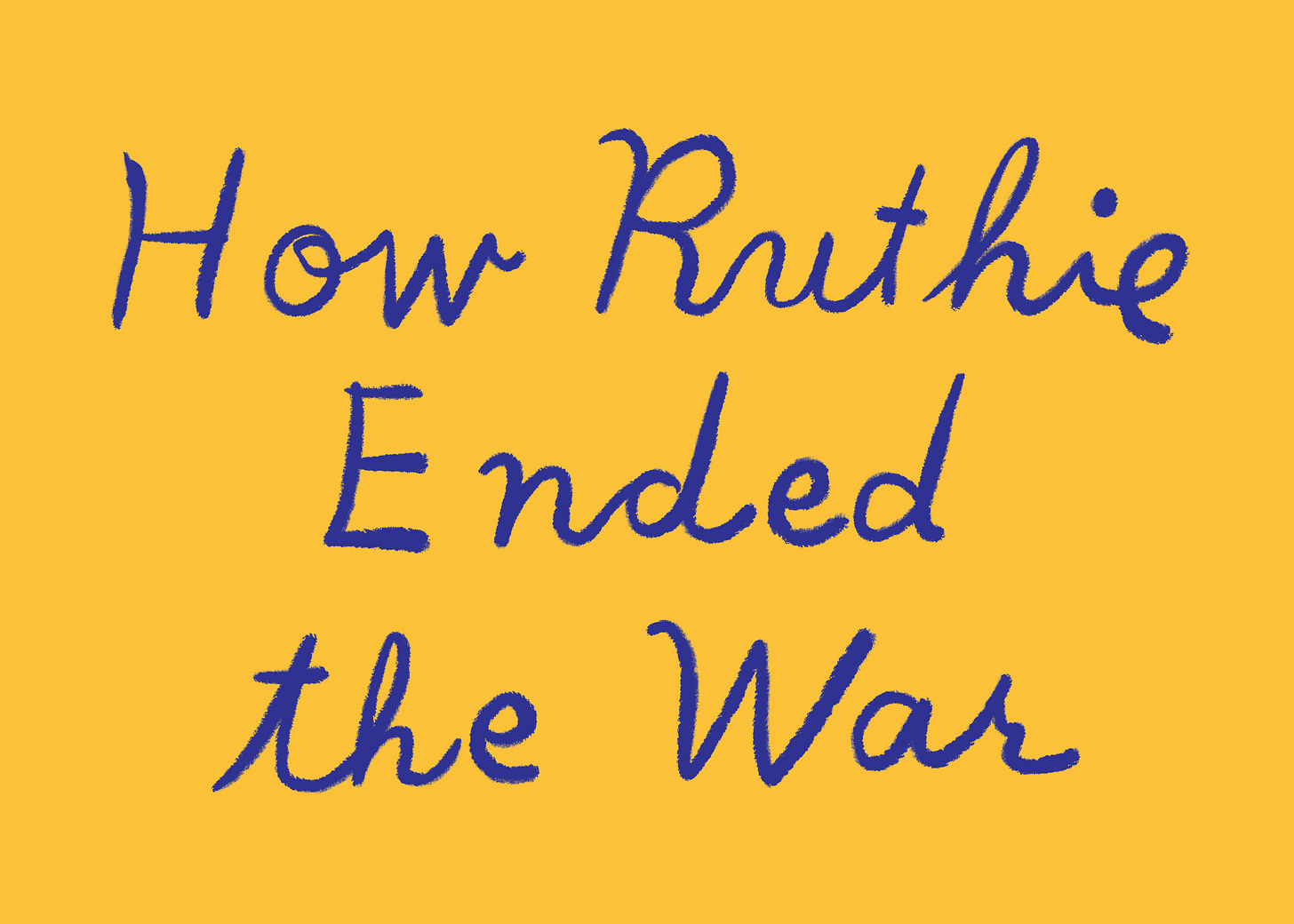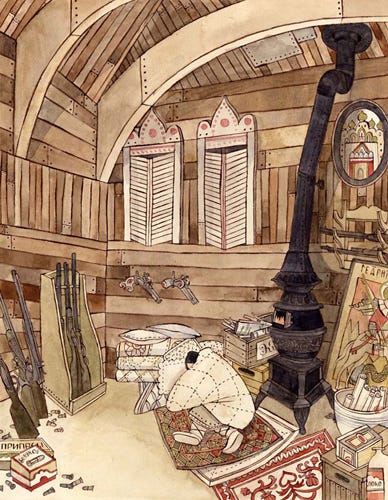How Ruthie Ended the War: Chapter Four
A night in the gunshed.
This is an ongoing serialization of an unfinished novel I wrote and Carson illustrated in 2001. New chapters will be published every Friday at 10 a.m. Read: Chapter One, Chapter Two, and Chapter Three.
Chapter Four
Though typically an inhospitable place, Ruthie, over time, had managed to make the gunshed into something of a cozy retreat for herself, and she no longer feared the penance that it served as a consequence for her infrequent disobediences. It still remained a stark and bitterly cold environment, its four walls barely supported by the ancient oaken roof beams that arched resplendently over the stone tiled floor. The harsh weather of those northern climes had bent yawning gaps between the wallboards, allowing free entrance to the stiff, chilling breezes that so commonly wandered the secluded landscape where the Baumbaums had, generations before, chosen to build their stately ancestral home. To the unaccustomed visitor, this odd, squat building would appear to be possibly the least hospitable bedroom on the globe, but to Ruthie, it had become a place of sweet respite from the stuffy affluence of her family’s winter home. Even the sound of the lock clicking from outside as Masha returned to the chateau had ceased to disturb Ruthie, serving only as yet another thing which distanced Ruthie from everything that was her father’s, everything that was strictly adult. Here in the gunshed, Ruthie was the queen of her own kingdom. Flintlock pistols and rifles lined the walls, dusty and cold from years of disuse, and in one of the corners sat a small, antiquated wood stove capable of moderately heating barely beyond the corner it occupied. It was here where Ruthie would set up her encampment of pillows and quilts which she had managed to amass during her first several sentences of exile.
The stash of firewood that lay like rubble against the stove was still mildly damp from months of disuse and it was several minutes before the wood begrudgingly gave way to fire under the gentle persuasion of Ruthie and her box of matches. The wind howled from without and Ruthie huddled near the stove under a pile of quilt and watched the flickering of the flames cast strange and ominous shadows against the guns that lined the walls. Between the soft howls of the reindeer, Ruthie could hear the sound of mortar shells exploding far, far in the distance, a sound to which she had become accustomed, as the Baumbaum’s chateau lay inexorably close to the Northern Front, where generals and admirals led great platoons of disciplined brigadiers and foot soldiers who in turn bombarded the enemy with barrage after barrage of mortar fire.
Through the cracks in the wall beams Ruthie could see the snow falling gently against the starless black of the cold night sky. She started momentarily at the sound of a mouse scurrying across the floor, her imagination imbuing it with the face and features of some terrible night creature. The mouse stopped in the middle of the floor and turned and looked at her, curiously. Annoyed at being startled, Ruthie hissed at the lingering mouse, sending it scurrying across the floor and out into the snow through a small hole in the wall. Ruthie sighed and stared at the silhouette of the Chateau through the slats of the wall, all of a sudden feeling very lonely indeed.
It had been nearly a year since she and her father had moved from St. Petersburg to the Winter Chateau and already she was feeling the pang to return. What she remembered of St. Petersburg--the smell of the bakeries in the morning, the rhythmic tacks of the street cars on the cold gray tarmac--she remembered as a little girl, with the sensitivities of a child. She had grown so much, she felt, in the past year, that she was ready to return to the city to experience it as a young woman might. She had, of late, taken to pestering her father to take her back, to allow them to spend a weekend back in their beloved Petersburg, but his gruff reply was always, “Maybe in the springtime.” A springtime had come and gone and still they had not left the dolor of their Northeastern home. M. Baubaum, mired in the tedium of his day to day responsibilities, scarcely left the house, his days spent constantly shuttered in his study, poring over the charters and manuscripts that detailed the monthly transactions of his business.
Messengers came every other week or so, providing a welcome influx of new faces to the Chateau’s stolid and unchanging social atmosphere, but they were as soon gone as they had come and Ruthie was left to watch their carriages disappear past the front gates and on to the road to St. Petersburg. The messengers were kind and sociable, and Pyotr had made a habit of making them a small meal in the kitchen before they left on their journey back to the city, an activity for which Ruthie would try to inconspicuously present, hoping she might coax a story out of the visitor about the goings-on in St. Petersburg. The messengers would tell her elaborate stories about the latest galas at the Palace; the most recent intrigues between the wealthy families; which Duchess was flirting with which Earl; which officers had rolled into town and how many ladies they had danced with at the Winter Gala; hilarious descriptions of the Tsarina’s tawdry fashions and the color of the ribbons the young ladies were wearing in the spring.
All this was ambrosia to Ruthie’s adolescent imagination and she would sit at the kitchen table with her chin in her hands and listen attentively until the messenger had finished his last spoonful of broth and would push himself away from the table, massaging his belly. Pyotr would then gather up the dishes and Ruthie would lead the messenger from the kitchen to the front hall where he would don his great cloak and walk out to his awaiting carriage, which would then lumber down the old park road and out of sight. Often, Ruthie imagined what it would be like to conceal herself in a visitor’s luggage to be stowed on the rack of a departing coach and six and not reveal herself until the coach had reached the long, perfumed canals and bridges of St. Petersburg, though, frankly, the idea of exploring such a vast urban territory by herself somewhat terrified the girl.
The fire in the stove spat and flickered and Ruthie’s eyelids began to grow heavy as she lay huddled within her quilted refuge. She could almost smell in the air the onset of morning and with it the return of Masha to the gunshed to relieve the young girl from her vigil. She lay her head down on the floorboards and slowly drifted into sleep, imagining the gravity of the lecture she would receive from her father the following morning, and with it the relief of inevitable forgiveness. There, in the half-light of her gradual decent into sleep, against the horizon of her shuttered eyelids, Ruthie watched as out of the blackness appeared the steeples and towers of the St. Petersburg skyline, pitching and wheeling through a fine skein of fog that curled about their onion-domed spires.
When she finally awoke in the morning, there was no sign of Masha.








